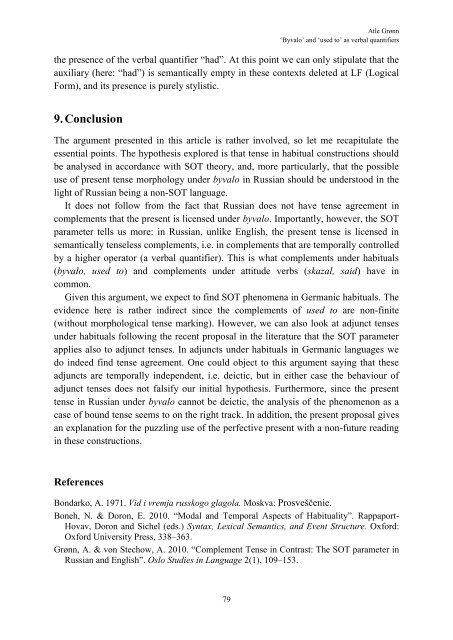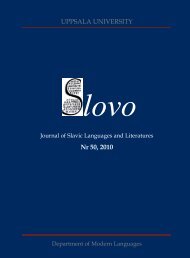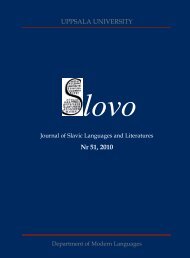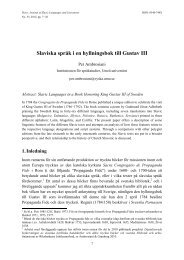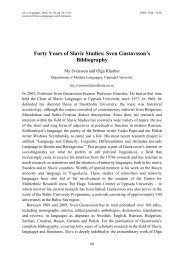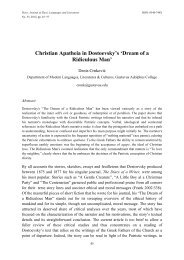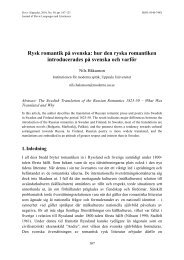Full text PDF - Index of - Uppsala universitet
Full text PDF - Index of - Uppsala universitet
Full text PDF - Index of - Uppsala universitet
You also want an ePaper? Increase the reach of your titles
YUMPU automatically turns print PDFs into web optimized ePapers that Google loves.
Atle Grønn<br />
‘Byvalo’ and ‘used to’ as verbal quantifiers<br />
the presence <strong>of</strong> the verbal quantifier “had”. At this point we can only stipulate that the<br />
auxiliary (here: “had”) is semantically empty in these con<strong>text</strong>s deleted at LF (Logical<br />
Form), and its presence is purely stylistic.<br />
9. Conclusion<br />
The argument presented in this article is rather involved, so let me recapitulate the<br />
essential points. The hypothesis explored is that tense in habitual constructions should<br />
be analysed in accordance with SOT theory, and, more particularly, that the possible<br />
use <strong>of</strong> present tense morphology under byvalo in Russian should be understood in the<br />
light <strong>of</strong> Russian being a non-SOT language.<br />
It does not follow from the fact that Russian does not have tense agreement in<br />
complements that the present is licensed under byvalo. Importantly, however, the SOT<br />
parameter tells us more: in Russian, unlike English, the present tense is licensed in<br />
semantically tenseless complements, i.e. in complements that are temporally controlled<br />
by a higher operator (a verbal quantifier). This is what complements under habituals<br />
(byvalo, used to) and complements under attitude verbs (skazal, said) have in<br />
common.<br />
Given this argument, we expect to find SOT phenomena in Germanic habituals. The<br />
evidence here is rather indirect since the complements <strong>of</strong> used to are non-finite<br />
(without morphological tense marking). However, we can also look at adjunct tenses<br />
under habituals following the recent proposal in the literature that the SOT parameter<br />
applies also to adjunct tenses. In adjuncts under habituals in Germanic languages we<br />
do indeed find tense agreement. One could object to this argument saying that these<br />
adjuncts are temporally independent, i.e. deictic, but in either case the behaviour <strong>of</strong><br />
adjunct tenses does not falsify our initial hypothesis. Furthermore, since the present<br />
tense in Russian under byvalo cannot be deictic, the analysis <strong>of</strong> the phenomenon as a<br />
case <strong>of</strong> bound tense seems to on the right track. In addition, the present proposal gives<br />
an explanation for the puzzling use <strong>of</strong> the perfective present with a non-future reading<br />
in these constructions.<br />
References<br />
Bondarko, A. 1971. Vid i vremja russkogo glagola. Moskva: Prosveščenie.<br />
Boneh, N. & Doron, E. 2010. “Modal and Temporal Aspects <strong>of</strong> Habituality”. Rappaport-<br />
Hovav, Doron and Sichel (eds.) Syntax, Lexical Semantics, and Event Structure. Oxford:<br />
Oxford University Press, 338–363.<br />
Grønn, A. & von Stechow, A. 2010. “Complement Tense in Contrast: The SOT parameter in<br />
Russian and English”. Oslo Studies in Language 2(1), 109–153.<br />
79


